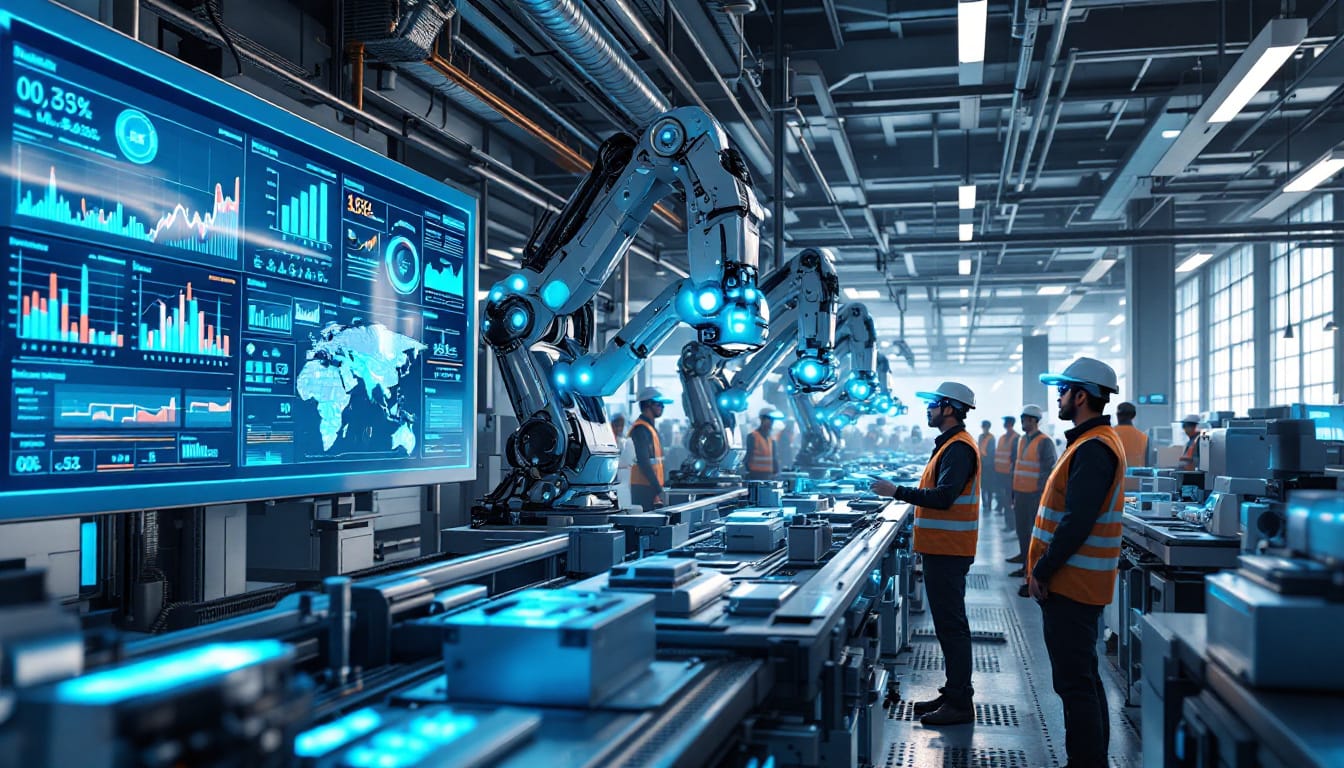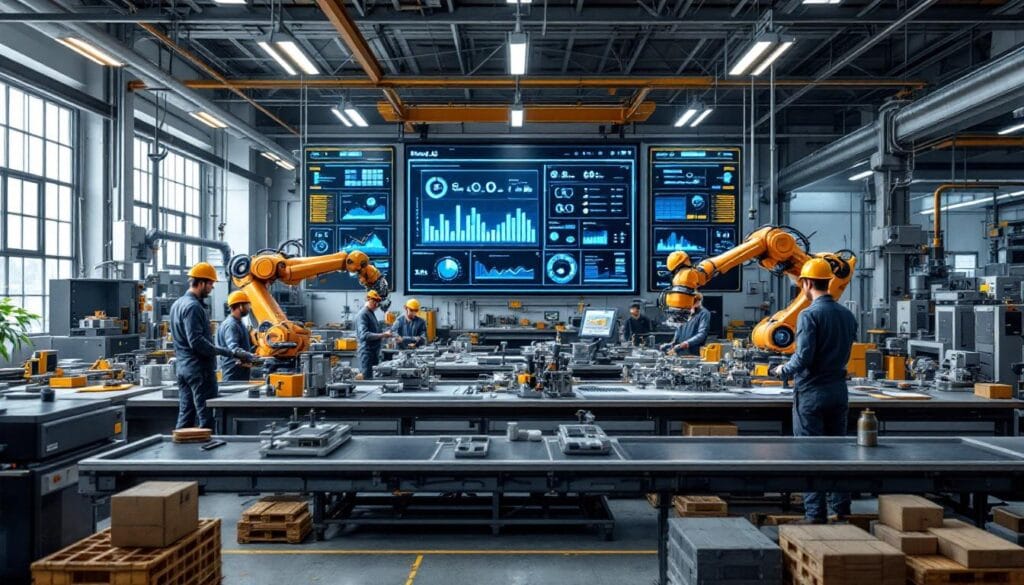Robots are not just coming – they are already present in sophisticated factories and American warehouse aisles. Smart factories are now a reality thanks to the Internet of Things.
Thanks to advanced robotics and IoT, production operates continuously with optimized remote management. Drones equipped with sensors are radically transforming logistics operations by automating the sorting and movement of goods. Autonomous trucks will soon be delivering products throughout the supply chain. These innovations offer unprecedented opportunities to improve productivity and resilience of supply chains in a rapidly changing industrial environment.

Table des matières
ToggleWhat is Industry 4.0 and its impact on manufacturing in the United States?
Industry 4.0 represents the fourth industrial revolution, characterized by the integration of advanced digital technologies into manufacturing processes. In the United States, this transformation is already underway, thanks to a robust infrastructure and a culture of continuous innovation. Industry 4.0 encompasses the Internet of Things (IoT), robotics, <strongartificial intelligence, and data analytics, allowing companies to create smart factories where machines communicate with each other and autonomously optimize production. This evolution not only improves efficiency and productivity but also reduces costs and quickly adapts production to market demands. In the United States, the manufacturing industry is well positioned to take advantage of these technologies due to its strong capacity for innovation and its significant talent pool in STEM (science, technology, engineering, and mathematics).
How smart factories are revolutionizing American production
Smart factories are at the heart of Industry 4.0, radically transforming the way products are manufactured and managed. Thanks to the Internet of Things, every device, from industrial robots to 3D printers, is connected and can be controlled remotely. This connectivity enables continuous production, 24 hours a day, and real-time management of operations. Smart factories also use sensor-equipped drones to optimize inventory management, scan barcodes, and autonomously move goods. This reduces the need for human intervention, increases safety, and improves accuracy. By integrating these technologies, American manufacturers can not only increase their production capacity but also enhance flexibility and responsiveness to market fluctuations, thus ensuring greater global competitiveness.
Automation and process optimization in Industry 4.0
Automation plays a crucial role in Industry 4.0, enabling companies to streamline their production processes and increase their efficiency. Robots and drones are now commonplace in factories and warehouses, performing repetitive tasks with unmatched precision. Moreover, artificial intelligence and machine learning facilitate continuous optimization of operations, anticipating machine failures and enabling predictive maintenance. According to an analysis by Accenture, industrial leaders capable of mastering these tools can increase their productivity by up to 30%, reduce costs, and discover new revenue sources. This process optimization not only enhances profitability but also ensures the sustainability of operations by minimizing waste and improving resource usage.
The importance of data and IoT in the modern supply chain
In the era of Industry 4.0, data plays a central role in managing the supply chain. The Internet of Things (IoT) allows for the collection of vast amounts of data at every stage of the production process, from material sourcing to equipment efficiency. This data is essential for analyzing and improving key performance indicators (KPIs), providing valuable insights for making informed decisions. However, managing these data volumes requires advanced analytical capabilities. Companies must invest in big data platforms that can process and interpret information efficiently. By integrating sophisticated analytics systems, companies can not only optimize their operations but also anticipate market demands and adjust their production accordingly. This strategic use of data strengthens the resilience of the supply chain and allows for better adaptation to market challenges and opportunities.
Challenges and opportunities for American industrial leaders
While Industry 4.0 offers countless opportunities to increase productivity and profitability, it also presents significant challenges for American industrial leaders. Traditionally, the United States has been at the forefront of innovation and automation culture, positioning it well to adopt new technologies of Industry 4.0. However, despite these strengths, the share of American manufacturing in global manufacturing value has declined from 29% in the early 1980s to 18.6% in 2015. This decline underscores the need for American companies to continue investing in advanced technologies and to focus on innovation to maintain their competitiveness. Leaders must also address aspects such as institutional frameworks and sustainability, aligning their strategies with regulations and minimizing the environmental impact of their operations. Initiatives such as the partnership of the American industry with fashion and sustainability show how companies can overcome these challenges through innovation and by adopting responsible practices.
The impact of Industry 4.0 on jobs and skills
The advent of Industry 4.0 is profoundly changing the landscape of employment and the skills required in the American manufacturing sector. With increasing automation, repetitive tasks are increasingly being assigned to smart machines, necessitating a retraining of the workforce to focus on more complex roles oriented towards data analysis and the management of advanced technologies. Cities that invest in STEM skills development, such as the San Francisco Bay Area and the Research Triangle in North Carolina, are becoming attractive hubs for tech talent. Local initiatives, like the launch of the Industry 4.0 Academy, show how educational institutions and companies collaborate to train a workforce suited to the demands of modern industry. Moreover, emerging cities like Austin and Denver are enhancing their attractiveness by emphasizing tech training and economic development. These efforts are essential to ensure that the United States has the necessary talent to support the transition to Industry 4.0 and fully leverage its many benefits.
Innovations and exemplary case studies in the American industry
Several innovations and exemplary case studies illustrate how the American industry is adopting and benefiting from Industry 4.0. For example, Hyundai has invested $76 billion in a mega-factory in Georgia, integrating advanced technologies to optimize production and reduce costs. Nokia enriches its application library for Industry 4.0 while launching a dedicated marketplace, facilitating access to innovative tools for manufacturers. Nokia and its initiatives are examples of the ongoing adaptation of businesses to new technologies.
In Indonesia, an alliance between fashion and Industry 4.0 demonstrates how traditional sectors can integrate advanced technologies while promoting sustainability. Additionally, podcasts like the one on adapting to Industry 4.0 provide enriching insights on the automation of intralogistics. These examples highlight the diversity of applications of Industry 4.0 and underscore the importance of continuous innovation to remain competitive. By adopting these technologies, American companies can not only improve their productivity but also create new opportunities for growth and sustainable development.




